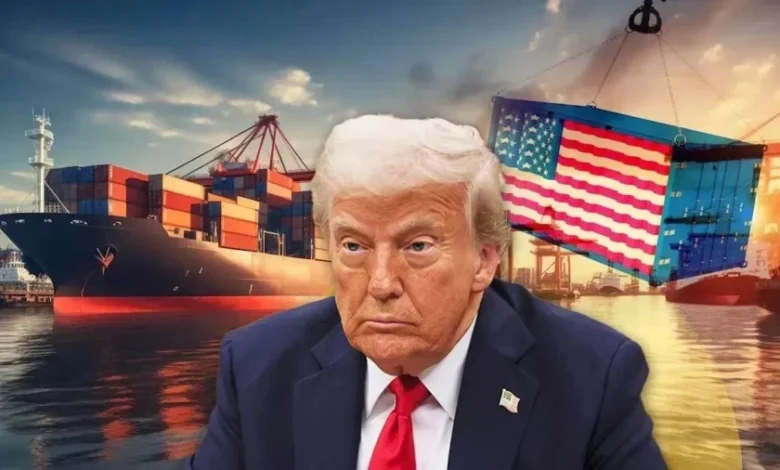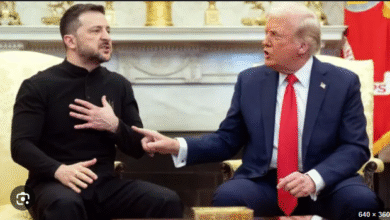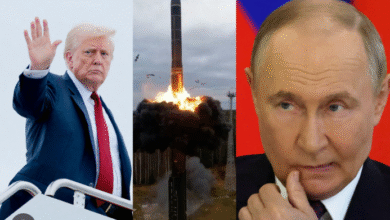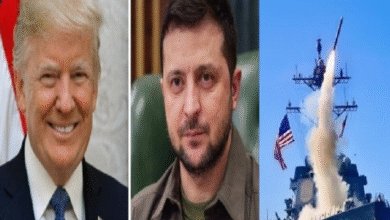‘यदि यूक्रेन युद्ध समाप्त नहीं हुआ, तो रूस ट्रंप के प्रति पुतिन कड़े आर्थिक प्रतिबंध लागू करेगा।’

Certainly! Here’s a rewritten version of the content, expanded for better clarity and engagement, and approximately 2000 words in length.
—
### The Political Landscape: Russia, Ukraine, and U.S. Relations
The ongoing conflict in Ukraine has not only reshaped the geopolitical landscape but also brought about significant shifts in the relationship between the United States and Russia. As the war continues with no end in sight, its implications stretch far beyond the borders of Ukraine, affecting international economies, security, and diplomatic ties.
One of the notable figures in this complex narrative is Donald Trump, former President of the United States. His approach to Russia, illustrated through his past policies and statements, has drawn considerable attention, especially in the context of economic sanctions. Trump’s administration had a contentious relationship with Russia, marked by a blend of both confrontation and dialogue. The former president’s actions and statements during this conflict highlight the intricacies of international relations, leveraging economic power as a tool for diplomacy.
#### Economic Sanctions: A Double-Edged Sword
The idea of imposing stringent economic sanctions on Russia is not a novel one. Sanctions have long been employed as a strategy to compel nations to align with international norms and values. Trump has made it clear that should the conflict in Ukraine persist, he would not hesitate to impose further economic restrictions on Russia. Economic sanctions are seen as a critical mechanism to pressure the Kremlin into reconsidering its actions regarding Ukraine.
The theory behind sanctions is relatively straightforward; they aim to create economic hardship that incentivizes a nation to change its behavior. In the case of Russia, various sectors such as finance, energy, and military goods have already been targeted. However, the efficacy of these sanctions is often debated. Critics argue that while they may hurt the Russian economy, they also contribute to a rally-around-the-flag effect, wherein the public unites behind their government in response to perceived external threats.
### Trump’s Position on Russia
Trump’s stance on Russia has been characterized by contradictions. While his administration did enact sanctions against Russia for its actions in Ukraine and its interference in the 2016 U.S. elections, Trump also often expressed admiration for President Vladimir Putin. This duality complicates the understanding of his foreign policy and raises questions about his intentions.
Despite this complexity, Trump’s rhetoric has clear implications. His warnings to Russia to cease its military aggressions against Ukraine signal a willingness to take a tough stance—if re-elected, he may pursue a more aggressive policy aimed at curbing Russian advances. The threat of economic penalties looms large in his strategy to deter further conflict.
### Diplomatic Relationships: A Changing Landscape
As the war in Ukraine rages on, the relationship between the U.S. and Russia may be at a crossroads. Presidential diplomacy plays a critical role, and many analysts are closely observing how Biden and Trump’s policies differ in handling this crisis. Trump has indicated that he believes a more robust approach to diplomacy could yield better results than the current trajectory of escalating sanctions and military support for Ukraine.
In discussions surrounding the war, Trump suggests that direct communication between global leaders might open pathways toward peace. He is quoted reflecting on the potential for dialogue, indicating that the key may lie in reconciling differences through face-to-face conversations rather than persistent hostility.
### Light at the End of the Tunnel?
In contrast, Russian President Vladimir Putin has echoed similar sentiments, albeit with a different approach. He asserts that amidst the challenging environment created by the war, there may exist opportunities for negotiation. His comments often reflect a desire to appear conciliatory while simultaneously reinforcing Russian sovereignty and national interests.
Putin’s description of seeing “light at the end of the tunnel” in reference to U.S.-Russia relations illustrates a willingness to entertain the notion of resolution. However, interpreting such statements requires a nuanced understanding of Russian foreign policy, which often operates on the principles of strength and strategic advantage.
### Economic Implications of Sanctions
The ramifications of ongoing discussions about economic sanctions are twofold. For one, there is the immediate impact on the Russian economy, including sectors that rely heavily on international markets and trade. Additionally, these measures can extend beyond Russia, influencing global markets, particularly in energy. Europe’s dependence on Russian oil and gas means that sanctions can have profound effects on prices and availability, leading to political and social ramifications across the continent.
On the other side of the equation, the United States and its allies must weigh the potential backlash of imposing sanctions. Economic fallout can lead to inflation and other domestic issues that may complicate the political landscape in these countries. These intricate dynamics necessitate careful consideration when policymakers devise strategies to address the conflict.
### The Role of International Alliances
As the war disrupts traditional alliances and power structures, NATO members have reaffirmed their commitment to standing united against Russian aggression. The collective defense strategy illustrates a significant shift in how nations perceive security threats. Trump has expressed his belief that NATO ultimately represents a pillar of strength in confronting challenges posed by Russia.
However, Trump’s previous criticisms of NATO’s funding structure have raised concerns about his commitment to alliance solidarity. In times of conflict, trust and reliability among allies become paramount. The varying approaches of U.S. presidents toward NATO could lead to varying levels of support for Ukraine—and the consequences of these differences are significant.
### Implications for Future Leadership
As the conflict continues, the outcomes could have lasting impacts not only on Russia and Ukraine but also on U.S. leadership. How Trump or Biden handles relations with Russia may define their legacies and shape future diplomatic engagements. Trump recognizes that foreign policy cannot merely be reactive; it requires anticipating next steps and potential outcomes.
The potential for meeting with Russian officials and stakeholders could provide opportunities for negotiation that have previously been overlooked. In Trump’s view, direct dialogue could pave the way for de-escalation. His belief in personal diplomacy may lead to a contrasting approach compared with Biden’s more conventional diplomatic strategies that lean toward multilateralism.
### Conclusion: The Future of U.S.-Russia Relations
In summation, the ongoing war in Ukraine has illuminated the complexities of U.S.-Russia relations, with significant implications for international stability. Economic sanctions remain a pivotal strategy in applying pressure on Russia, but the effectiveness of these measures continues to be debated. The interactions and strategies of current and potential future leaders will undoubtedly shape the trajectory of not only U.S.-Russia relations but also the global political arena.
Whether through sanctions or diplomatic efforts, the necessary conversations about peace and resolution must continue. The ultimate goal should be to foster an environment where future conflicts can be avoided, ensuring lasting stability not only in Europe but worldwide.
The journey ahead is undoubtedly complicated, with historical animosities and geopolitical interests at play, but the potential for resolution remains a hopeful aspiration for leaders and citizens alike. As decisions are made in the halls of power, the need for thoughtful and deliberate action has never been more pressing. The stakes are high, and the world is watching closely as events unfold.






